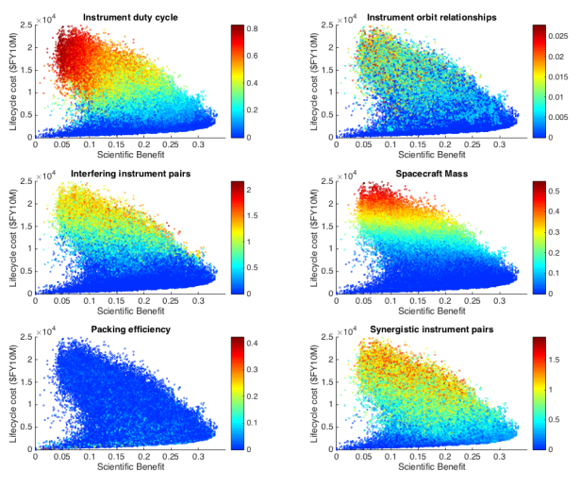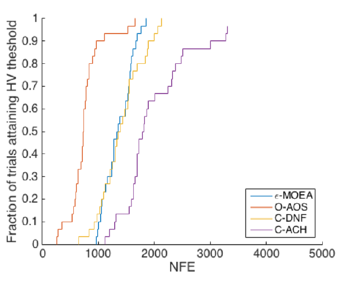Evolutionary algorithms such as NSGA-II, epsilon-MOEA and others are very popular in design. They evolve a population of solutions (designs) by iteratively applying a set of operators such as different types of crossover and mutation. These operators are purely domain-independent, i.e., they do not use any domain knowledge. However, expert designers have a lot of knowledge about how to design good systems; why not use it?
The problem is harder than it sounds, because just using domain-specific operators often results in premature convergence to local optima and reduced diversity in the population. Also, not all reasonable expert knowledge is actually useful for a particular problem. For example, the figure below shows how some perfectly reasonable heuristics for designing Earth observing systems show widely different performance for a specific problem

Our lab has developed new algorithms that use a pool of domain-independent and domain-specific operators. An adaptive operator selection strategy based on reinforcement learning keeps track of the performance of each operator and assigns solutions to each operator proportionally to its performance. This way, we can exploit good expert knowledge to accelerate convergence towards good designs while avoiding “bad” expert knowledge and maintaining good explorative capabilities. The figure below shows how our algorithms do statistically significantly better than not using the knowledge (eps-MOEA) or using the knowledge through other methods, such as adaptive constraint handling.

Publications:
[1] N. Hitomi and D. Selva, “Incorporating expert knowledge into evolutionary algorithms with operators and constraints to design satellite systems,” Appl. Soft Comput. J., vol. 66, no. May 2018, pp. 330–345, 2018.
[2] N. Hitomi and D. Selva, “A Classification and Comparison of Credit Assignment Strategies in Multiobjective Adaptive Operator Selection,” IEEE Trans. Evol. Comput., vol. 21, no. 2, pp. 294–314, 2017.
[3] N. Hitomi and D. Selva, “A hyper-heuristic approach to leveraging domain knowledge in multi-objective evolutionary algorithms,” in Proceedings of the ASME 2016 International Design Engineering Technical Conferences & Computers and Information in Engineering Conference IDETC/CIE 2016, 2016.
[4] N. Hitomi and D. Selva, “The effect of credit definition and aggregation strategies on multi-objective hyper-heuristics,” in ASME 2015 International Design Engineering Technical Conferences and Computers and Information in Engineering Conference., 2015, vol. 2B–2015.